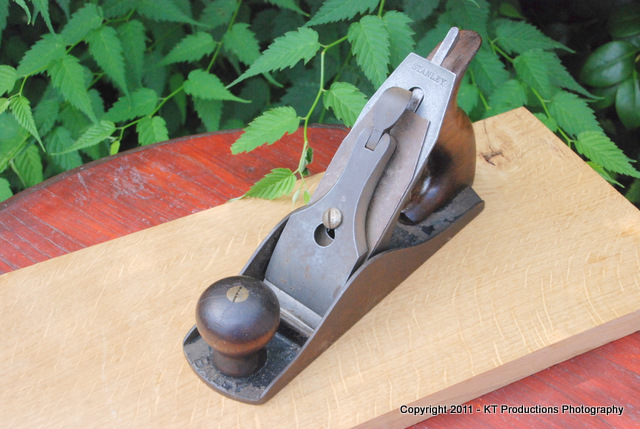J_SAMa
Established Member
Hi,
I recently bought a pre-WWII, low-knob, type 10, perfectly flat-soled, lateral adjustment-with-spinny disk Stanley No.7.
(Okay I'll stop showing off...)
Most screws are running just fine. The only real problem it has is surface rust. I don't want to use abrasives because I can't find a flat surface as big as the plane and I don't want to ruin the perfectly flat sole that the previous owner has lapped (god bless him for saving me from doing it ). Any ways I can remove the rust without abrading metal off of the sole? I want to avoid using things like acid baths or Corro Dip as I don't want to handle something so messy, plus the stuff is expensive. Should I try WD-40? Will it harm the paint/japanning? Do I rub the plane with WD-40? If so what substrate?
). Any ways I can remove the rust without abrading metal off of the sole? I want to avoid using things like acid baths or Corro Dip as I don't want to handle something so messy, plus the stuff is expensive. Should I try WD-40? Will it harm the paint/japanning? Do I rub the plane with WD-40? If so what substrate?
BTW, the previous owner replaced the iron with a 2 1/4" one :? (why would he prefer a narrower one for a jointer). Does anyone still make thin irons? I tried one of those thick ones on my No. 04 and the adjuster often slips out...
Pics:



I would say this is the worst part of the sole:

Sam
I recently bought a pre-WWII, low-knob, type 10, perfectly flat-soled, lateral adjustment-with-spinny disk Stanley No.7.
(Okay I'll stop showing off...)
Most screws are running just fine. The only real problem it has is surface rust. I don't want to use abrasives because I can't find a flat surface as big as the plane and I don't want to ruin the perfectly flat sole that the previous owner has lapped (god bless him for saving me from doing it
BTW, the previous owner replaced the iron with a 2 1/4" one :? (why would he prefer a narrower one for a jointer). Does anyone still make thin irons? I tried one of those thick ones on my No. 04 and the adjuster often slips out...
Pics:



I would say this is the worst part of the sole:

Sam

































